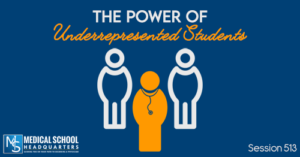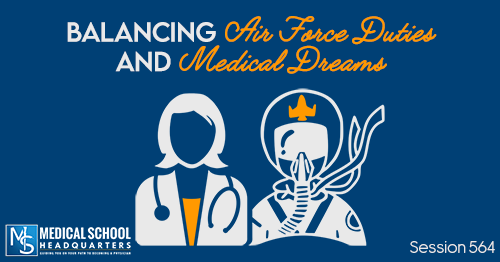Apple Podcasts | Google Podcasts
Session 513
Join me as I talk with Dr. Cedric Bright, as we talk about his journey in academic medicine and the underrepresented students he has guided that have the power to transform healthcare. Cedric is the Vice Dean for Medical Education and Admissions at The Brody School of Medicine.
For more podcast resources to help you with your medical school journey and beyond, check out Meded Media.
Listen to this podcast episode with the player above, or keep reading for the highlights and takeaway points.
[01:02] The MCAT Minute
The MCAT Minute is brought to you by Blueprint MCAT.
Sign up for a free account at Blueprint MCAT and get free access to their study planner tool so you can begin mapping out your plan for your MCAT prep.
[02:30] Interest in Being a Physician
Cedric grew up with parents who were both public school teachers and they were big into reading. He remembers reading a series of books about different occupations. He wanted to be a doctor while his brother wanted to be an engineer. 25 years later, Cedric became a physician and his brother became an engineer.
Being the first black male to attend the school’s residency program and the first black male to be hired in their faculty, Cedric found his passion in helping underrepresented students reach their goals. He is currently involved in medical school admissions and the administration at their medical school. He is helping underrepresented students get into medical school to help fix our workforce diversity issues.
“When we have people that have that proclivity to care from the beginning, who have that altruistic spirit… Those are the types of physicians that will transform healthcare.”Click To Tweet[08:40] Navigating Diversity
Cedric believes that as long as there is a racism issue in the world, we will always have headwinds. And so we have to just expect it and be prepared for it. Although it’s now more covert, it’s still not over. And we can still figure things out.
Cedric encourages students to not be afraid to be the only one as long as they know who they are. People can tell you anything they want to call you, and it won’t stick because you’ve already defined who you are and what your purpose is.
“If you want to be something strong and something great, you have to plant roots, and you have to grow like a tree.”Click To Tweet[11:38] Promoting Cultural Competence
A recent paper suggests that the number of black men matriculating into medical school was higher in 1978 than it was in 2014. Cedric thinks the public school systems are under-resourced. Many teachers in the public school system don’t encourage dreams.
That being said, there’s good news to the story. Since 2014, we have seen an increase in the number of black males coming to medical school. It specifically went from 515 in 2014 to 680 in 2020 and to 841 in 2022.
Cedric believes the paper was sort of a clarion call because anything that raises awareness makes people start focusing on that and they become more intentional. There are also now more programs exposing college students who have become physicians, especially black males and even black athletes.
Ultimately, you can’t ask the oppressed to solve their oppression. Instead, those who oppress need to realize that oppression is not the right thing to do.
'We have our differences but we need to understand that difference does not mean deficient.'Click To Tweet[20:30] Thoughts on Race-Based Admissions
Cedric explains they have a holistic admissions process in their medical school. It means there is not one aspect of the application that is more important than another part of the application. He explains the analogy of the four tires on a car. Each one of those tires has to have a certain amount of air in it in order for the car to operate efficiently. Certainly, one tire can have a little more air. The car can still run. But if you get a flat tire, then you will need to get some help.
Now, each one of those tires is represented by a domain, like your GPA, your MCAT score, your clinical hours, or the amount of volunteerism that you have. Then the admissions committees look at the type of motors that you have. They look at where you come from and they look at everything, except for the race. They don’t look at race because they look at all these other things.
'If we are truly operating from a holistic review process, and we're weighing everything equally, then race will not be an issue.'Click To TweetCurrently, Cedric sees the need to mitigate our unconscious bias. We have to put our admissions committee through training to help them understand their unconscious bias so they don’t operate from that perspective. This is why they hold blind interviews where the only thing they know about that candidate is what shows up on the screen.
[28:21] How Do We Mitigate the MCAT-Related and Application Concerns
Cedric says it’s important to work hand-in-hand with the AAMC to address these issues. These are things like looking at how to decrease the threshold for students to get some fee assistance. We also work on moving to virtual platforms, so students don’t have to pay to travel to go to different medical schools. Once we go back to in-person interviews, Cedric reckons we’re going to see some disadvantages.
We also have to help students get better at their test-taking skills. They often write essays for their test exam questions, as opposed to taking multiple-choice questions. And then the multiple choice questions have different levels of rigor.
'That's why most applications from people of color end up coming in later because they had to raise the money to apply.'Click To Tweet[32:49] Transparency in Rolling Admissions
Many students are actually calling for more transparency from medical schools in terms of what they’re looking for and what makes a successful applicant. For instance, people who apply in June are going to be more successful because of rolling admissions. But no schools are talking about that.
Cedric says that at their school, even if students apply later in the year, they still have the opportunity to get in. And although they might not be able to change some parts of the system such as the fees and all that, they’re trying their best to provide information in the best way possible.
[38:05] How Students Can Play a Role in Addressing Diversity Issues
Cedric says that if you want to play a bigger role, learn about people who are different than you. Celebrate things that are different, as opposed to calling what is different a deficiency.
Work on becoming more collaborative. Learn how to become fingers that come together to form a fist, and work collaboratively.
Asking for help is not a sign of weakness. Instead, it’s a badge of strength. Because when you become a physician, and you don’t know something, you’re going to need to ask for help. So get comfortable with asking people for help.
Cedric adds that one of the critical thinking skills that you have to develop is the ability to look at a resource and figure out if there’s any bias behind it. Then you have to try to find those where you can find the facts because facts are supposedly unbiased. Finally, stand up for something otherwise, you’ll keep falling for everything.
[43:55] Final Words of Wisdom
Cedric leaves us with this African proverb that says, “If you want to go fast, go alone. If you want to go far, take somebody with you.” On the days that you feel like you don’t belong and don’t feel like you’re included, they’ll be the ones that will lift your spirits up and remind you that indeed, yes, you are worth it.
Cedric also highlights the power of positive affirmations. He encourages students to post affirmation statements that they can read regularly to remind themselves of their worth and that they can do it. Keep reading them until you believe them.
Finally, if you don’t get into medical school the first time, remember that your dream is not denied at that particular moment. If you’re willing to keep fighting and keep getting back up every time you fall down, eventually, you will get to your dream.
Embrace failure, embrace your past, and understand that you have what you need within you and it’s important to surround yourself with people who will help bring that out.












